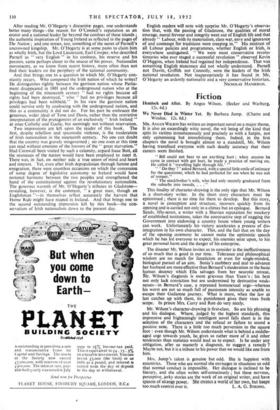Fiction
MR. ANGuS WILSON has written an important novel on a major theme. It is also an exceedingly witty novel, the wit being of the kind that spits its victims instantaneously and precisely as with a hatpin, not only epitomising but immobilising - them. Indeed, in the first chapters the novel is brought almost to a standstill, Mr. Wilson having transfixed everyone with such deadly accuracy that their careers seem finished.
"Bill could not bear to see anything hurt ; when anyone he came in contact with got hurt, he made a practice of moving on. He called it 'travelling light through life.' " " Do they ? asked Bernard, with a special little smile of intimacy for the questioner, which he had perfected for use when he was out of temper."
"The stockbroker's wife, who had only recently graduated from the suburbs into tweeds, . . ."
This finality of character-drawing is the only sign that Mr. Wilson is a short-story writer. In the short story characters must be epitomised ; there is no time for them to develop. But this story, a novel in conception and structure, recovers quickly from its opening and is carried not only to a climax but an epilogue. Bernard Sands, fifty-seven, a writer with a Shavian reputation for mockery of established institutions, takes the constructive step of nagging the Government into endowing a country house where young writers can work. Unfortunately his victory accelerates g process of dis- integration in his own character. This, and the fact that on the day of the opening ceremony he cannot make the optimistic speech which he has led everyone to expect, his enemies seize upon, to his great personal harm and the danger of his enterprise.
The disaster Mr. Wilson invites us to consider is the ineffectiveness of so much that is good in our time. Tolerance and philosophical wisdom are no match for fanaticism or even for single-minded, biological pursuit of an aim. Sonia 's snobbery and zeal to advance her husband are more effective than Bernard's moderation or the basic human decency which Ella salvages from her neurotic retreat. Mr. Wilson's diagnosis is more grievous than Yeats's : his best not only lack, conviction but are undermined by destructive weak- nesses—in Bernard's case, a repressed homosexual urge—whereas his worst are not so much full of passionate intensity as unable to escape their Gadarene journey. What is more, when the law at last catches up with them, its punishment gives their vices fresh scope. In prison Mrs. Curry and Ron do very nicely.
Mr. Wilson's character-drawing is first-class. So are his phrasing and his dialogue. Where, judged by the highest standards, this impressive and frighteningly intelligent .novel falls short is in the selection of the characters and the refusal or failure to sound a positive note. There is a little too much perversion to the square foot : even though Mr. Wilson understands what is behind a middle- aged urge towards youth, he gives us rather more of it and other tendencies than statistics would lead us to expect. Is he under any obligation, after so masterly a diagnosis, to suggest a remedy ? Maybe not, but it is a tribute to his power that we would like one from him.
Mrs. Jump's talent. is genuine but odd. She is happiest with eccentrics. Those who are normal she envisages in situations so odd that normal conduct is impossible. Her dialogue is inclined to be literary, and she often writes self-consciously ; but these nervous, perceptive, jerky stories are the work of an original writer, and have spasms of strange power. She creates a world of her own,. but keeps


































 Previous page
Previous page